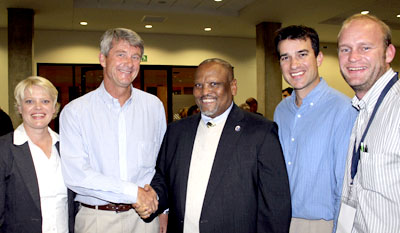Latest News Archive
Please select Category, Year, and then Month to display items
06 April 2018
Photo Rulanzen Martin
 From the left: Dr Thulisile Mphambukeli, leader of the BRICS research team that is exploring the political economy of water and food security, and her research partner, Dr Victor Okorie.
From the left: Dr Thulisile Mphambukeli, leader of the BRICS research team that is exploring the political economy of water and food security, and her research partner, Dr Victor Okorie.
A Brazil, Russia, India, China and South Africa (BRICS) delegation is to hold the 10th Annual BRICS Summit in the last week of May 2018 in Johannesburg. Dr Thulisile Mphambukeli, leader of the University of the Free State (UFS) research team alongside Dr Victor Okorie from the Department of Urban and Regional Planning, in collaboration with Prof Lere Amusan of North-West University, will ensure that water and food security is a prominent feature on the gathering’s agenda.
First, the project titled: “Exploring the political economy of water and food security nexus in BRICS and Africa” will debut at the National Institute for the Humanities and Social Sciences BRICS Think Tank Forum”.
According to Dr Mphambukeli, the key to water security is attitudinal change by means of education and conscientisation. This, she is adamant about, holds the potential to drive behavioural adjustments in the way society interacts with water.
Genetic and social approaches
Dr Okorie asserts that if strides towards reducing the demand for water were to be made, research efforts should be geared towards effecting changes at DNA level. Meaning we need to explore waterwise ways that enable crops and animals to thrive optimally.
The project also looks at social dimensions of water such as flushing a toilet. “Research activities on redesigning toilets, especially the urinal, where more than nine litres of water are used to flush less than one cubic centimetre of urine, are timely in the context of managing water and the food nexus crises,” said Dr Okorie.
Combining the genetic and social approaches would allow us to produce more with a smaller water footprint. This can be made possible by implementing precision agriculture which is about estimating and applying exact quantities of water and nutrients needed for the production of crops or the raising of livestock.
Paradigm shifting policies
Prof Amusan said the team intended to propose functional solutions that take the quality of water into consideration. Equitable production and distribution of water depends on endorsing policies of co-production between citizens, governments and the public sector. BRICS member states mutually consider water and food security as an issue of paramount significance, hence its feature on this prestigious summit’s agenda.
'Physical education at school level important,' says Minister
2010-09-16
 |
|
At the conference were, from the left: Monique de Milander, Prof. Johan Bloemhoff, Rev. Makhenkesi Stofile, Emile Langeveld and Riaan Schoeman.
|
A record number of four staff members from the Department of Exercise and Sport Sciences at the University of the Free State (UFS) presented papers at the South African Sport and Recreation Conference (SASreCon). This conference was presented by Sport and Recreation South Africa (SRSA) from the National Department of Sport and Recreation. This is South Africa’s primary national conference on sport and exercise science.
The conference, that was hosted by the University of KwaZulu-Natal in Durban with the theme Sport, Recreation and Physical Education – An Essential Triad, highlighted the important triangular relationship between sports science, recreation and physical education. A host of leading South African and international speakers presented papers on key topics that are relevant to the South African sports and exercise landscape.
The four staff members who attended also had the opportunity to meet the Minister of Sport and Recreation, Rev. Makhenkesi Stofile. The Minister reiterated the importance of physical education at school level to ensure that South Africa can compete against the best in the world at stadiums such as the iconic Moses Mabhida Stadium, where the function was hosted.